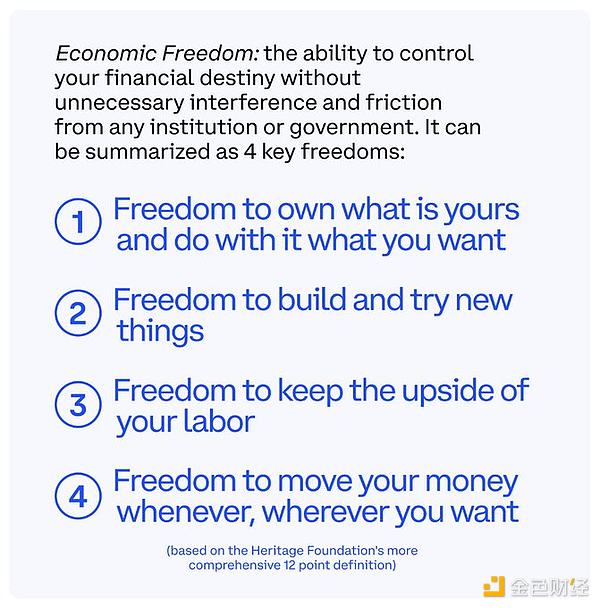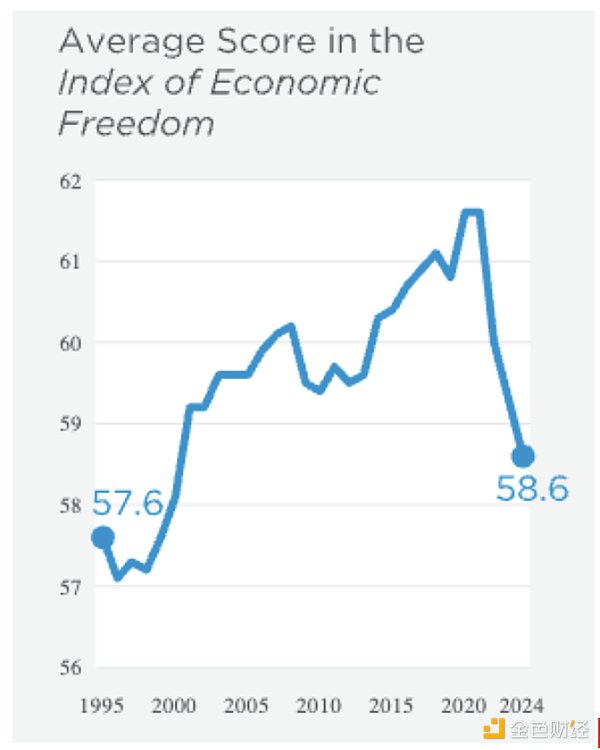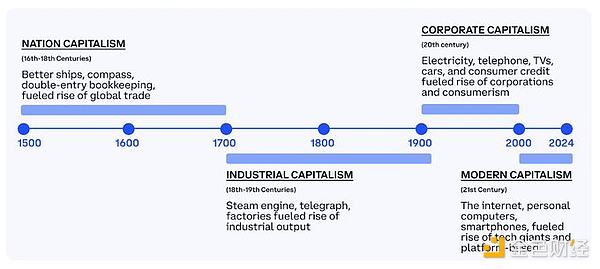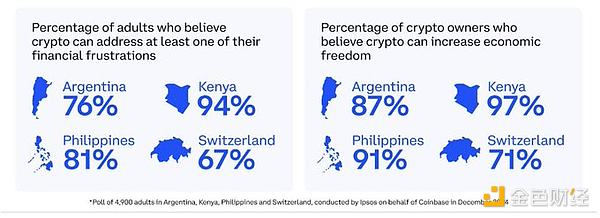Author: Brian Armstrong, Coinbase CEO; Translator: 0xjs@黄金财经
In the United States, people voted for more economic freedom and free markets when they elected Donald Trump in 2024. Canada seems to be on a similar path with Pierre Poilievre. Argentine President Mille and Latin American President Bukele of El Salvador led the movement in 2023. In the UK, Starmer is turning to an agenda that supports technology and innovation in an attempt to attract more voters, while in Germany, Schulz is likely to be voted out soon due to a slowdown in the economy caused by poor fiscal policies.
We are at a critical moment in history: the world is beginning to realize the dangers of big governmentism, seeing that it hurts the people it claims to protect the most and has never worked in practice. However, some people are still moving in the wrong direction. China rose under the free market policies of Deng Xiaoping.
Economic growth comes from free market capitalism, deregulation, small government, and technological innovation. Economic growth brings lower prices, more jobs, higher tax revenues, better health care, and more. The best way to lift people out of poverty and create prosperity for all is not socialism, but free market capitalism. If other countries in the G20 want to participate in economic prosperity, they would be wise to join the growing trend of embracing economic freedom and free markets.
At Coinbase, our mission has always been to increase economic freedom in the world. Just like freedom of speech or freedom of religion, economic freedom is essential to a prosperous society and the advancement of civilization. We believe that cryptocurrency is the most important technology that can bring economic freedom to the world.
 Everyone around the world cares about and deserves economic freedom. According to our survey, more than three-quarters of adults worldwide say they want more economic freedom. This is not surprising, as economic freedom has been shown to increase happiness, improve literacy, improve the environment, and many other positive social indicators (according to data from the World Bank, Pew Research Center, and the World Economic Forum).
Everyone around the world cares about and deserves economic freedom. According to our survey, more than three-quarters of adults worldwide say they want more economic freedom. This is not surprising, as economic freedom has been shown to increase happiness, improve literacy, improve the environment, and many other positive social indicators (according to data from the World Bank, Pew Research Center, and the World Economic Forum).
However, economic freedom is declining, and the world's economies are mostly unfree.
We were on the right track for the past 100 years - economic freedom was rising, but in the early 21st century, things took a sharp turn for the worse. The global average economic freedom score is now the lowest it has been since 2001. Result: People in most economies around the world are mostly considered unfree, or even repressed.

In the United States, this means that living standards are falling and most people feel that the American Dream is unattainable. Only 14% of Americans are optimistic about the future of the financial system. Around the world, 70% of adults now say that their children will be worse off financially than their parents. The loss of economic freedom has caused people to lose confidence in the system.
What is the reason for the recent rise in socialism? Why does this experiment keep being tried? It seems that there is something in human nature that is attracted to socialism, and each generation needs to learn that lesson the hard way. For some, the practice is motivated by a sincere desire to help others, without realizing that these policies hurt the very people they claim to help. For others, they exploit ignorant people to gain power, or the practice stems from a deeper hatred of themselves or humanity.
Whatever the reason, history shows us that whenever we face a challenge, we as a species can invent creative solutions. From the printing press to the steam engine, from electricity to the internet - each breakthrough has revitalized economies, empowered people, and advanced civilization. Cryptocurrency is the next chapter in this story.

Cryptocurrency can usher in the next chapter of capitalism: the era of economic freedom
Coinbase's core thesis: Widespread adoption and use of crypto technology will increase economic freedom. This is based on the promise of creating a global economy based on crypto technology, driven by technology and people rather than governments, where anyone with an internet connection can participate, property rights are enforced, and money retains its value. This is not a dream. Crypto is already creating more economic freedom for real people today:
1. Stablecoins:Stablecoins are poised to be the next killer app for cryptocurrencies, with transaction volumes growing more than 3x year-over-year to about $27 trillion. Stablecoins are becoming part of people’s daily financial lives, not just for transactions, especially in emerging markets, which lead the world in stablecoin adoption. 5 million Argentines actively use cryptocurrencies for daily transactions and saving dollars is the second most popular emerging market use case.
2. Free Trade:Cryptocurrencies operate on a global network, unrestricted by middlemen and national borders, thus facilitating free trade. L2 can now complete global transactions in 1 second for less than 1 cent, making cryptocurrency the only payment method that meets all 3 conditions: fast, cheap, and global. This brings unprecedented freedom of trade to individuals and businesses. Cryptocurrency simple sending is instant, cheap, and has no imposed restrictions - unlike traditional services which are often regionalized and/or have restrictions on transaction frequency and amount. Just ask people why they use cryptocurrencies. A Visa study found that one of the top reasons people in Australia, Brazil, Germany, Hong Kong, South Africa, the United States, and the United Kingdom use cryptocurrency is the freedom of transactions and lower fees.
3. Property Rights:Cryptocurrencies enable secure and enforceable property rights by replacing courts or middlemen with code and cryptographic security. Governments are turning to cryptocurrencies to address the >5 billion people around the world who lack proof of home/land ownership. On the blockchain, ownership is immutable and smart contracts can be used to automate and enforce the rights that come with ownership. For example, Georgia is putting land records on the blockchain and Sweden is testing a cryptographic system for land registries.
4. Access without permission:Cryptocurrencies are removing borders to create a more inclusive global financial system where people can both keep more of their hard-earned money and do more with it. Decentralized Finance (DeFi) is revolutionizing access to financial services, providing equal opportunity for anyone with an internet connection—from rural entrepreneurs to the 1.4 billion unbanked people—to participate in the global economy.
Cryptocurrency adoption and usage has reached escape velocity. Almost 7% of the World Now Owns Crypto Because People Are Turning to It to Solve Real Problems:

How to Increase Economic Freedom in 2025
World Leaders and Policymakers: Now is the Time to Embrace Crypto + Tech Optimism to Accelerate Economic Freedom and Human Progress. Here are four practical things you can do this year: 1. Pass laws to ensure that cryptocurrencies thrive onshore. Cryptocurrency is a new and unique technology that should not be constrained by outdated laws. Policymakers should focus on developing clear, forward-looking regulatory frameworks to foster this innovation, rather than pushing it offshore - otherwise they may fall behind. 2. Build a strategic reserve of Bitcoin. It is the best-performing asset class since its inception and has cemented its position as an inflation hedge. The next global arms race will be in the digital economy, not in space. Bitcoin could become as fundamental to the global economy as gold, and will become central to national security, as Bitcoin holdings can shift the balance of power between countries. Governments will compete to build strategic Bitcoin reserves to safeguard and enhance their economies, and those without Bitcoin reserves will lose their footing in the digital age. 3. Support special economic zones, where builders are free to try out big ideas. You can use sandboxes to safely experiment and innovate, allowing builders to learn by doing. We’ve seen this work well historically in cities like Shenzhen and Hong Kong, and new projects like Prospera have the potential to accelerate innovation by embracing crypto.
4. Improve government efficiency. Similar to what Milei and DOGE did, we are coming to the realization that excessively big government is not an effective solution to problems, but often the problem itself is the problem. No matter who you are or where you are, cryptocurrency is for you. Even if you don’t own or use cryptocurrency-powered financial services, you will still benefit. Cryptocurrency acts as a check and balance for the people, against heavy-handed government, over-regulation, legal battles, rising deficits, and constrained innovation.
Everyone: All of us should demand and build a path forward where builders, innovation, and free markets (not governments) are the drivers of economic growth. We must embrace economic freedom. Civilizational progress depends on it.
 Anais
Anais

 Everyone around the world cares about and deserves economic freedom. According to our survey, more than three-quarters of adults worldwide say they want more economic freedom. This is not surprising, as economic freedom has been shown to increase happiness, improve literacy, improve the environment, and many other positive social indicators (according to data from the World Bank, Pew Research Center, and the World Economic Forum).
Everyone around the world cares about and deserves economic freedom. According to our survey, more than three-quarters of adults worldwide say they want more economic freedom. This is not surprising, as economic freedom has been shown to increase happiness, improve literacy, improve the environment, and many other positive social indicators (according to data from the World Bank, Pew Research Center, and the World Economic Forum). 






